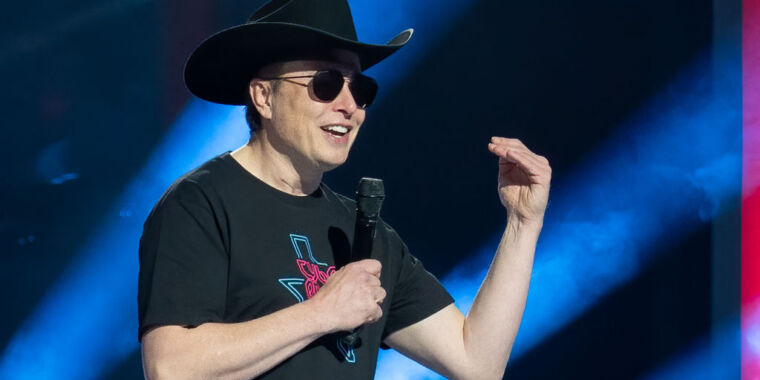X filing “thermonuclear lawsuit” in Texas should be “fatal,” Media Matters says

Ever since Elon Musk’s X Corp sued Media Matters for America (MMFA) over a pair of reports that X (formerly Twitter) claims caused an advertiser exodus in 2023, one big question has remained for onlookers: Why is this fight happening in Texas?
In a motion to dismiss filed in Texas’ northern district last month, MMFA argued that X’s lawsuit should be dismissed not just because of a “fatal jurisdictional defect,” but “dismissal is also required for lack of venue.”
Notably, MMFA is based in Washington, DC, while “X is organized under Nevada law and maintains its principal place of business in San Francisco, California, where its own terms of service require users of its platform to litigate any disputes.”
“Texas is not a fair or reasonable forum for this lawsuit,” MMFA argued, suggesting that “the case must be dismissed or transferred” because “neither the parties nor the cause of action has any connection to Texas.”
Last Friday, X responded to the motion to dismiss, claiming that the lawsuit—which Musk has described as “thermonuclear”—was appropriately filed in Texas because MMFA “intentionally” targeted readers and at least two X advertisers located in Texas, Oracle and AT&T. According to X, because MMFA “identified Oracle, a Texas-based corporation, by name in its coverage,” MMFA “cannot claim surprise at being held to answer for its conduct in Texas.” X also claimed that Texas has jurisdiction because Musk resides in Texas and “makes numerous critical business decisions about X while in Texas.”
This so-called targeting of Texans caused a “substantial part” of alleged financial harms that X attributes to MMFA’s reporting, X alleged.
According to X, MMFA specifically targeted X in Texas by sending newsletters sharing its reports with “hundreds or thousands” of Texas readers and by allegedly soliciting donations from Texans to support MMFA’s reporting.
But MMFA pushed back, saying that “Texas subscribers comprise a disproportionately small percentage of Media Matters’ newsletter recipients” and that MMFA did “not solicit Texas donors to fund Media Matters’s journalism concerning X.” Because of this, X’s “efforts to concoct claim-related Texas contacts amount to a series of shots in the dark, uninformed guesses, and irrelevant tangents,” MMFA argued.
On top of that, MMFA argued that X could not attribute any financial harms allegedly caused by MMFA’s reports to either of the two Texas-based advertisers that X named in its court filings. Oracle, MMFA said, “by X’s own admission,… did not withdraw its ads” from X, and AT&T was not named in MMFA’s reporting, and thus, “any investigation AT&T did into its ad placement on X was of its own volition and is not plausibly connected to Media Matters.” MMFA has argued that advertisers, particularly sophisticated Fortune 500 companies, made their own decisions to stop advertising on X, perhaps due to widely reported increases in hate speech on X or even Musk’s own seemingly antisemitic posting.
Ars could not immediately reach X, Oracle, or AT&T for comment.
X’s suit allegedly designed to break MMFA
MMFA President Angelo Carusone, who is a defendant in X’s lawsuit, told Ars that X’s recent filing has continued to “expose” the lawsuit as a “meritless and vexatious effort to inflict maximum damage on critical research and reporting about the platform.”
“It’s solely designed to basically break us or stop us from doing the work that we were doing originally,” Carusone said, confirming that the lawsuit has negatively impacted MMFA’s hate speech research on X.
MMFA argued that Musk could have sued in other jurisdictions, such as Maryland, DC, or California, and MMFA would not have disputed the venue, but Carusone suggested that Musk sued in Texas in hopes that it would be “a more friendly jurisdiction.”
X filing “thermonuclear lawsuit” in Texas should be “fatal,” Media Matters says Read More »


